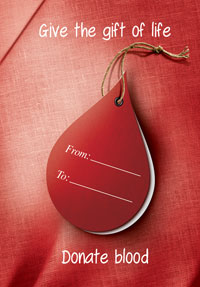 A single unit of donated blood can save up to three lives. Many patients requiring transfusion, particularly in developing countries, do not have timely access to safe blood.3 June 2013 – This week, the tenth anniversary of World Blood Donor Day will be celebrated under the slogan "Give the gift of life: donate blood". The Day, which is celebrated globally, aims to encourage voluntary, unpaid and safe blood donation to help fill the gap in blood supplies and ensure the flow of safe blood worldwide.
A single unit of donated blood can save up to three lives. Many patients requiring transfusion, particularly in developing countries, do not have timely access to safe blood.3 June 2013 – This week, the tenth anniversary of World Blood Donor Day will be celebrated under the slogan "Give the gift of life: donate blood". The Day, which is celebrated globally, aims to encourage voluntary, unpaid and safe blood donation to help fill the gap in blood supplies and ensure the flow of safe blood worldwide.
Every year, 92 million blood donations are collected worldwide. Approximately half of these donations are collected in high-income countries, home to only 15% of the world’s population.
Low- and middle-income countries, including countries of the Eastern Mediterranean Region, suffer from severe shortage of voluntary non-remunerated blood donations while the need for blood supplies is huge; the greatest use of donated blood in these countries is for pregnancy-related complications and severe childhood anaemia.
In high-income countries, transfusion is most commonly used for supportive care in heart surgery, transplant surgery, massive trauma and cancer therapy.
WHO’s goal is for all countries to obtain all their blood supplies from 100% voluntary unpaid blood donations by 2020, as regular voluntary donations have been found to be a safer source of blood than those who donate blood for family members or for payment. Blood collection from voluntary non-remunerated blood donors is the cornerstone of a safe and sufficient blood supply. Regular voluntary blood donors are the safest source of blood, as there are fewer bloodborne infections among these donors than those donating for family or payment. Currently, only 62 countries collect 100% of blood supplies from voluntary unpaid donors.
“Providing safe and adequate blood through well-organized, national blood systems should be an integral part of every country’s national health care policy”, says Dr Ala Alwan, WHO Regional Director for the Eastern Mediterranean. “Raising awareness among the public of their role in ensuring an adequate supply of blood is one of our objectives in marking World Blood Donor Day.
WHO provides policy guidance and technical support to countries to ensure that safe blood and blood products are available and are used appropriately for all people who need them.




